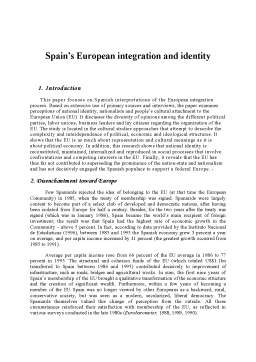Extras din proiect
1. Introduction
This paper focuses on Spanish interpretations of the European integration process. Based on extensive use of primary sources and interviews, the paper examines perceptions of national identity, nationalism and people’s cultural attachment to the European Union (EU). It discusses the diversity of opinions among the different political parties, labor unions, business leaders and lay citizens regarding the organization of the EU. The study is located in the cultural studies approaches that attempt to describe the complexity and interdependence of political, economic and ideological structures. It shows that the EU is as much about representation and cultural meanings as it is about political economy. In addition, this research shows that national identity is reconstituted, maintained, internalized and reproduced in social processes that involve confrontations and competing interests in the EU. Finally, it reveals that the EU has thus far not contributed to superseding the prominence of the nation-state and nationalism and has not decisively engaged the Spanish populace to support a federal Europe. -
2. Disenchantment toward Europe
Few Spaniards rejected the idea of belonging to the EU (at that time the European Community) in 1985, when the treaty of membership was signed. Spaniards were largely content to become part of a select club of developed and democratic nations, after having been isolated from Europe for half a century. Besides, for the two years after the treaty was signed (which was in January 1986), Spain became the world’s main recipient of foreign invest¬ment; the result was that Spain had the highest rate of economic growth in the Community – above 5 percent. In fact, according to data provided by the Instituto Nacional de Estadisticas (1996), between 1985 and 1995 the Spanish economy grew 3 percent a year on average, and per capita income increased by 41 percent (the greatest growth occurred from 1985 to 1991).
Average per capita income rose from 66 percent of the EU average in 1986 to 77 percent in 1995. The structural and cohesion funds of the EU (which totaled US$1.1bn transferred to Spain between 1986 and 1995) contributed decisively to improvement of infrastructure, such as roads, bridges and agri¬cultural works. In sum, the first nine years of Spain’s membership of the EU brought a qualitative transformation of the economic structure and the creation of significant wealth. Furthermore, within a few years of becoming a member of the EU Spain was no longer viewed by other Europeans as a backward, rural, conservative society, but was seen as a modern, secular¬ized, liberal democracy. The Spaniards themselves valued this change of perception from the outside. All these circumstances reinforced their satis¬faction with membership of the EU, as reflected in various surveys con¬ducted in the late 1980s (Eurobarometer, 1988, 1989, 1990).
Since 1992, however, this support has been dwindling. Whereas at the end of the 1980s almost 70 percent of Spaniards felt positive about belonging to the EU (Eurobarometer, 1991), by 1996 this proportion had declined to 51 percent (Eurobarometer, 1996). The proportion of people who view membership of the EU as negative for Spain has grown from 9 percent in 1986 to 20 percent in 1997. The proportion of those who think that membership has been neither negative nor positive has also increased: from 21 percent in 1986 to 26 percent in 1997 (Centro de Investigaciones Soci¬ologicas, 1995; Euro barometer, 1997). This trend is also reflected in my in-depth interviews, which reveal that several factors have contributed to the erosion of support for the EU and have triggered a deep-seated attachment to the nation-state. These include perceptions that Spain’s economic situ¬ation is no better now than in the past: ‘I see that being part of the Euro¬pean Union has not produced more jobs, and the cost of living is going up’; that Spain is not playing an important role in the Union: ‘the problem with Europe is that it is really run by France and Germany. Spain is a secondary actor’ (political leader, IU, Andalucia); and that the country is losing national sovereignty: ‘more often than not, Spain has to accept the propo¬sitions of its more powerful partners. In that context, there is a clear loss of national sovereignty’ (political leader, PP, Galicia) and national identity: ‘with the European Union we are changing; we are losing our national characteristics’ (government agency employee).
3. National sovereignty and national identity
Today, 64 percent of the Spanish lay people and 53 percent of the political and union leaders believe that the EU strongly influences Spanish policies while Spain has little say in the EU (Centro de Investigaciones Sociologicas, 1995; personal interviews 1996, 1997):
The Spanish nation should not be forced to give up its sovereignty as it is doing now to the European Union. Just look at who occupies the most important positions in the European organization. We are hardly getting secondary offices. (miner, Asturias)
Several experiences regarding Spain’s relations with the EU have caused these feelings in recent years. In 1993, for example, the Spanish government hoped to obtain the headquarters of a relevant EU office such as the Environ¬ment Agency. Instead Spain was assigned the Office for Harmonization of the Internal Market, a much less prestigious organization. Again, in the second half of 1993 and early 1994, during the negotiations for admission of the Nordic countries, the EU accepted none of Spain’s main propositions regarding institutional reforms. Then, in 1995, Spain was engaged in a con¬frontation with Canada over fishing rights; many respondents believe that Canada was able to impose most of its conditions because Spain could not obtain solid backing from the EU. Also in 1995, in a confrontation over fishing rights with Morocco, the European Commission was unable to modify Morocco’s position in favor of Spain.
Preview document
Conținut arhivă zip
- Spain's European Integration and Identity.doc














